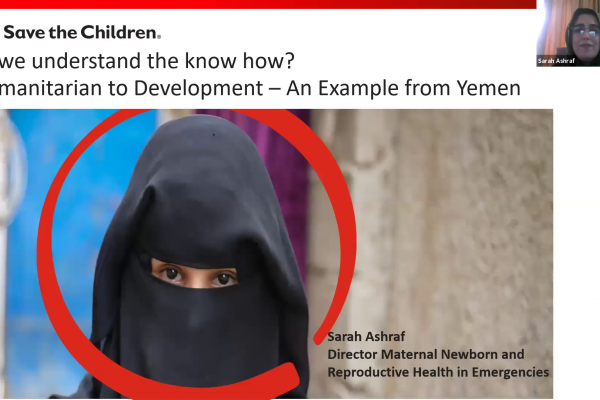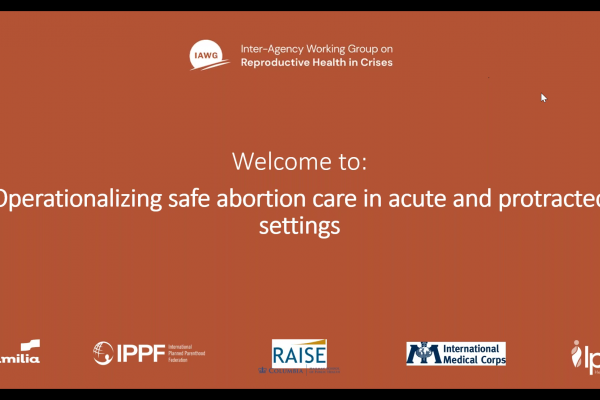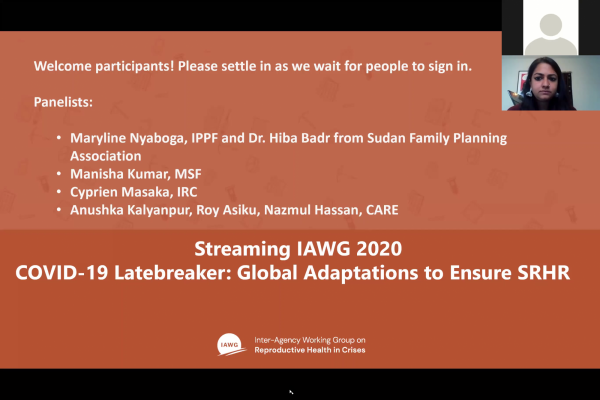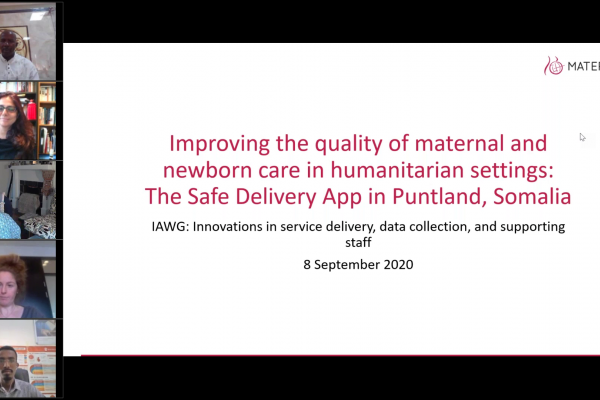In order to ensure all inter-agency users of the IARH kits understand the significant changes to the 6th edition of the kits, UNFPA will be hosting a launch webinar together with the IAWG Supplies Sub-Working Group. The webinar specifically targets IAWG partners who are users of the IARH kits in the field
We are pleased to announce the global launch of the Adolescent Sexual and Reproductive Health Toolkit (ASRH) for Humanitarian Settings: 2020 Edition. The launches will be co-developed and co-facilitated by the IAWG ASRH sub-working group, adolescents and young people, international and local organizations, and all those interested in making these events as engaging and inclusive as possible.
We are pleased to announce the global launch of the Adolescent Sexual and Reproductive Health Toolkit (ASRH) for Humanitarian Settings: 2020 Edition. The launches will be co-developed and co-facilitated by the IAWG ASRH sub-working group, adolescents and young people, international and local organizations, and all those interested in making these events as engaging and inclusive as possible.
The Women’s Refugee Commission will share key findings from a mixed-methods study assessing the landscape of family planning services across diverse, crisis-affected settings.
The toolkit was developed by Family Planning 2020, the International Planned Parenthood Federation (IPPF), John Snow, Inc., Women’s Refugee Commission, and United Nations Population Fund (UNFPA) in collaboration with the Inter-Agency Working Group on Reproductive Health in Crises (IAWG). Speakers include Beth Schlachter, Executive Director, FP2020 and Dr. Natalia Kanem, Executive Director, UNFPA.
The Women’s Refugee Commission will share key findings from a mixed-methods study assessing the landscape of family planning services across diverse, crisis-affected settings.
This panel will launch a joint advocacy brief developed by these coalitions containing recommendations for governments, donors, and implementing agencies from development and humanitarian settings to improve access to universal health care by focusing on supply chain strengthening at the points where humanitarian and development work converge. It will also present several examples of SRH supply chain interventions in the humanitarian-development nexus at global, regional, and national scales that exemplify some of the recommendations made in the advocacy brief.


Safe abortion care (SAC) is a proven and life-saving intervention to prevent maternal death and morbidity and to manage the consequences of sexual violence in emergencies. Yet despite a culmination of factors that place vulnerable women and girls at increased risk of unintended and unwanted pregnancy, refugees and internally displaced people are systematically denied access to safe abortion care, often even when it is legally allowed, due to a variety of reasons and myths including incorrect assumptions about women’s beliefs, deprioritizing SAC in service delivery, and misunderstanding of the law. This panel will report findings of community perceptions around safe abortion in South Sudan, MISP implementation gaps and challenges in Colombia, and innovative use of “legal risk” as a lens to assess the legal context for abortion work.

COVID-19 threatens women and girls in profound ways beyond the virus, and refugees and people affected by humanitarian crises are particularly vulnerable. Humanitarian actors and local organizations have been adapting in real-time and finding solutions to provide sexual and reproductive health (SRH) care. Presenters from around the world will describe their experiences adapting to meet the needs of women and girls and share data on SRH use during the pandemic. Participants will have an opportunity to exchange with the panelists after presentations of their work.

When a crisis strikes, women and girls need lifesaving sexual and reproductive health (SRH) information and services, including contraception. The Minimum Initial Service Package (MISP) for SRH, the internationally accepted standard of care for SRH in emergencies, mandates the provision of contraceptive services from the outset of a crisis. Evidence shows that women and girls affected by crises want and need access to contraception, and will use it when available. Yet access to contraception remains a critical gap in humanitarian settings.

Innovation has never seemed so important as it has this year. In this webinar, panelists will describe their innovative work pre-pandemic as they were forced to adapt interventions to the unique circumstances of the remote and difficult humanitarian settings where they work. They will present on their use of technology solutions to improve psychosocial support for humanitarian staff, monitoring and reporting using a call center in South Sudan, a mobile app for improving maternal delivery and the skills of health workers facing newborn emergencies.
